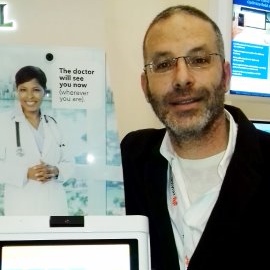SA
Israeli hi-tech on show in Cape Town
Many take access to medical attention for granted, but this is not the case for those who live in rural areas, far from the nearest hospital or medical practitioner.

MOIRA SCHNEIDER
Telemedicine – the remote diagnosis and treatment of patients by means of telecommunications technology – is revolutionising the practise of medicine and one such operator, Equatel Health, was exhibiting at AfricaCom, along with over 20 other Israeli tech companies, at the Cape Town International Convention Centre last week.
It was billed as the largest Africa-focused technology event in the world.
Equatel Health focuses on digital health services for the rural and urban population, Gershon Gutmer, vice-president, tells the SA Jewish Report at the expo. The company has built a digital health kiosk that allows for remote consultation for those who have limited access to health services, using the existing infrastructure of mobile providers.
“So, anywhere that you have 3G or 4G Internet connectivity, with our solution you’re able to have a remote consultation with a doctor, speak to him, see him on video. You can have all your vital signs and blood tests done remotely as well as scans for pregnant women.
“The doctor could be in Johannesburg and the patient in any remote area of South Africa and they communicate in real time. So, instead of you going to the doctor, we’ve brought the doctor to you.”
Patients can pull up additional information, from how to dress a wound, to queries on pregnancy and childcare.
Equatel’s product is unique in that it allows one to do everything on one platform, from making an appointment, to the medical consultation, to receiving a prescription, to the online mobile payment, all accessed with an Equatel SIM or smartcard.
“Our main customers are hospitals, doctors and health ministries, with mobile operators forming a big part of our business, as we move data from the patients to the doctors.”
The company also works with NGOs – Unicef in Uganda and USAid in Ghana. Today it has more than 2 000 digital kiosks around the world, not all situated in rural areas.
“Our biggest project is in India with a healthcare company that operates 52 hospitals. The waiting time to see a doctor is three to four hours, so now when you arrive, there’s a nurse who does all the tests, it goes through the cloud and the doctor sees all your results by the end of the day.
“If there’s something wrong, they will call you back. In the meantime, you can go back to work or care for your children,” says Gutmer.
At the expo’s national pavilion, Israel’s leading hi-tech companies showcased the latest solutions for mobile communications. The country is, for example, a leader in cyber security products and accounts for more than 10 per cent of worldwide sales in this area, says Itai Melchior, trade attaché at the Israeli Embassy.
“Some of the companies here have developed the software to prevent our phones being penetrable by third parties, which is important for many organisations (given that) today many employees are using their own phones for company e-mails and (accessing) databases.” Inpedio, for example, provides cutting-edge cyber solutions to government and business sector customers around the world.
Melchior says that close to a thousand meetings have taken place over the three-day expo, a third of them being with South African entities and two thirds from the rest of Africa. “We’ve really had a great response, no politics – we’ve even had interest from ‘surprising’ countries who just want to see the technology,” he states.
One Smart Star has developed an app that allows one to contact emergency services or any other service provider with a short dial – star plus four digits – and the relevant website will open visually as a menu with all the options, thus averting the frustrating experience of hanging on endlessly to call centres.
Co-founded in Israel in 2004 by David Sussan, initially to sell short numbers for company call centres (for example *Visa or *Avis), today the company, with a worldwide patent, services over 250 000 operators, including all the international brands as well as government offices.
“In Israel, by law all government offices must have a star number and this app in order to serve the citizens better,” he says.
Thanks to the company’s visual integrated voice response (IVR) technology, one needn’t waste time listening to laborious instructions, Sussan explains.
“On the tablet you get to a landing page and choose by clicking on any department you want or to go to social media to send an e-mail, and we cater for 50 languages.” This is all done via the One Smart Star master application that one downloads onto one’s phone free of charge, giving access to thousands of companies.
Most important, Sussan says, is that the company provides the app free of charge to the police in many countries.
“On the home page, we have a panic button to the police – so if somebody breaks into your house, you press it and they can see the location, they can hear and they come to help without you talking to them.
“So, actually we are saving lives and we’d be happy to provide it free of charge to the police in South Africa. What is nice,” he adds, “is that if you download the *Pol app and you travel tomorrow to Israel or to Fiji, for example, you will have a panic button to the local police on the home page.” Literally at your fingertips.